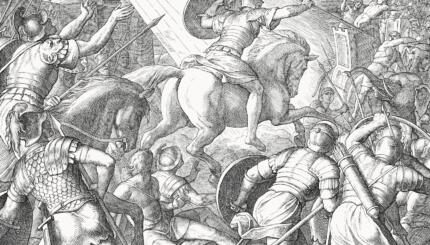Eternal light in the ancient Temple symbolized an uninterrupted connection between God and the people. When the Romans desecrated the Temple that connection was ruptured, but when the menorah was re-kindled with the tiniest amount of remaining oil, the light did not go out, lasting until new oil could be rendered. The miracle was an event of great comfort in the time of the Maccabees, and can be, to us, in our own time. The deep miracle of Chanukah is that, despite profound breaches, the flow of divine energy into our world does not cease.
But the Maccabean miracle was not purely supernatural. After all, they fought their foes, cleaned up their sanctuary, hastened to produce more oil, and maintained faith. Part of the miracle of Chanukah is its empowerment of us as consequential agents in our own survival, agents of social justice, and in maintaining God’s light. Just as God never stops flowing toward us, humankind has always and will always partner with God in maintaining that wonder.
Tonight, the community I lead as rabbi celebrated together, singing and playing our instruments, and lighting our menorahs. In our midst were two young men, new citizens of our country whom we sponsored as refugees a few months ago. Now, they are flourishing, free of fear, and integrating into the circle of our friendship.
Although this was not the first night of the holiday, we recited a shehecheyanu, giving thanks for a momentous transformation of fate. Our gesture of support and kinship is small in the face of what is needed to save the peoples of our world, but the presence of these precious men is a miracle, none the less. And our consciousness is raised to the very real possibility of breathing new life and new faith into hopeless situations, to the possibility of rekindling lives with the tiniest amount of fuel, and the very real possibility of defying the destructions of our moment.
menorah
Pronounced: muh-NOHR-uh, Origin: Hebrew, a lamp or candelabra, often used to refer to the Hanukkah menorah, or Hanukkiah.



